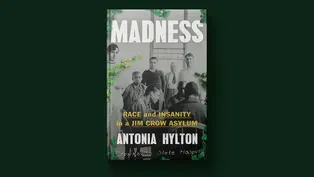
Alcohol-related deaths surge in Colorado
Clip: 1/24/2024 | 5m 27sVideo has Closed Captions
Alcohol-related deaths surge in Colorado with a higher mortality rate than opioids
Alcohol remains one of the leading causes of preventable deaths in the U.S. Every year, more people die of alcohol-related causes than drug overdoses. While states have focused their attention on fighting the opioid epidemic, the problems with alcohol have largely been overlooked. William Brangham discussed how this is affecting Colorado with Denver Post reporter Meg Wingerter.
Problems with Closed Captions? Closed Captioning Feedback
Problems with Closed Captions? Closed Captioning Feedback
Major corporate funding for the PBS News Hour is provided by BDO, BNSF, Consumer Cellular, American Cruise Lines, and Raymond James. Funding for the PBS NewsHour Weekend is provided by...

Alcohol-related deaths surge in Colorado
Clip: 1/24/2024 | 5m 27sVideo has Closed Captions
Alcohol remains one of the leading causes of preventable deaths in the U.S. Every year, more people die of alcohol-related causes than drug overdoses. While states have focused their attention on fighting the opioid epidemic, the problems with alcohol have largely been overlooked. William Brangham discussed how this is affecting Colorado with Denver Post reporter Meg Wingerter.
Problems with Closed Captions? Closed Captioning Feedback
How to Watch PBS News Hour
PBS News Hour is available to stream on pbs.org and the free PBS App, available on iPhone, Apple TV, Android TV, Android smartphones, Amazon Fire TV, Amazon Fire Tablet, Roku, Samsung Smart TV, and Vizio.
Providing Support for PBS.org
Learn Moreabout PBS online sponsorshipdeaths in the U.S. Every year, more# people die of alcohol-rela than drug overdoses.
But problems# with alcohol often go overlooked.
William Brangham looks at how# this is affecting the western## part of the country, and one state in particular.
WILLIAM BRANGHAM: While alcohol is problematic# everywhere, Colorado has one of of alcohol-related deaths in the country.
Drinking# deaths in the state spiked 60 percent between 2018## and 2021.
In 2022, more than 1,500 people# in the state died from excessive drinking,## a slight decline from earlier, but that is# still 50 percent above pre-pandemic levels.
When you also take into account deaths from# chronic long-term conditions related to alcohol,## the death toll doubles, a number that far# exceeds the deaths from opioids.
But as## The Denver Post reported in a new four-part# series, alcohol has not been treated with the## same urgency as opioids.
That series# is called "Colorado's Quiet Killer."
And reporter Meg Wingerter joins me now.
Meg, thank you so much for being here.
Your series is titled the "Quiet# Killer."
Why do you refe MEG WINGERTER, The Denver Post: It's quiet in the# sense that it hasn't generated much attention.
We hear about the number of people who are dying# of opioids, which, of course, is a massive killer## that we need to pay attention to.
But there's# not really the awareness that alcohol can also## be deadly.
When I was writing this series and# interviewing people, other than people who## specifically study alcohol, there was just not# really this awareness that the death toll could## be anything comparable, because, well, I mean,# it's not something people talk about very much.
Most -- many people would really rather# not admit if excessive drinking was## what killed their loved one.
So we# just don't have the conversation.
WILLIAM BRANGHAM: When we talk about# categorizing deaths from alcohol,## can you break those down for us?
Are# we talking about accidents where people## are intoxicated?
Is this chronic# conditions?
What are these deaths?
MEG WINGERTER: I'm glad you asked that,# because, when I was interviewing people,## often, what would come up is, they# would assume that this was a of people dying in crashes or young people# drinking themselves to death in one ni But what it is mostly is longer-term conditions,# a lot of liver disease, some cancers, some heart## conditions, deaths by suicide where people# were intoxicated at the time, which makes you## more impulsive, more likely to follow through# in suicide if you were having those thoughts.
So it does look different than what# people expect.
Accidents are a problem,## but they're not the biggest source of the problem.
WILLIAM BRANGHAM: Are there things# that public health experts told mi ght help for the state to do# to help bring MEG WINGERTER: Well, there's no one magic thing# that, if we do this, it will bring -- make a huge## impact on deaths, but there are a lot# of small things that can nudge people.
When alcohol taxes go up, people tend to somewhat# reduce their consumption.
When alcohol is not## as convenient, people also will tend to drink a# little bit less.
There are cultural things, trying## to give people alternatives and kind of normalize# events where drinking isn't at the center of it.
Now, none of those is going# to completely fix the problem,## but they each kind of give people a nudge# toward reducing their consum over time, adds up to fewer people# developing these chronic conditions.
WILLIAM BRANGHAM: I mean, alcohol, as your# reporting shows, is so ingrained in our culture.
Even though we are in the middle of Dry January,## I mean, it's kind of notable that we even# have a m a culture.
Were you surprised overall by# the things that you found in your series?
MEG WINGERTER: Yes.
I had actually just kind of lo oked at those, and that seemed high,# compared it to the overdoses.
But as I## started talking to people more about the number of# conditions that it's involved in, it makes sense.
The odds an average drinker will die# from alcohol are much lower than the## odds an average illicit fentanyl user will# die from the substance they're using.
But so## many people drink that it then adds# up to this very large toll.
And it## is uncomfortable to talk about in a way that# illicit drugs are not, because so many of us## enjoy having a drink and don't necessarily# want to hear that it could be a problem.
WILLIAM BRANGHAM: All right, that# is Meg Wingerter of The Denver Post.
Thank you so much for sharing# your reporting with us.
MEG WINGERTER: Thank you for having me.
Democratic, GOP strategists break down Biden-Trump rematch
Video has Closed Captions
Clip: 1/24/2024 | 8m 12s | Democratic and Republican strategists break down likely Biden-Trump rematch (8m 12s)
Experts discuss threat posed by Iran, fears of regional war
Video has Closed Captions
Clip: 1/24/2024 | 11m 44s | Experts weigh in on threat posed by Iran and line U.S. is walking to avoid regional war (11m 44s)
Haley sets sights on S.C. in uphill climb against Trump
Video has Closed Captions
Clip: 1/24/2024 | 5m 25s | Nikki Haley sets sights on South Carolina in uphill climb against Trump (5m 25s)
'Madness' details racism of Crownsville mental hospital
Video has Closed Captions
Clip: 1/24/2024 | 7m 34s | New book 'Madness' documents the racism of a Jim Crow-era mental health facility (7m 34s)
Oscar nominations spark controversy with Barbie snubs
Video has Closed Captions
Clip: 1/24/2024 | 5m 14s | Oscar nominations spark controversy with snubs of Barbie's Margot Robbie, Greta Gerwig (5m 14s)
Video shows shooting of apparently unarmed man in Gaza
Video has Closed Captions
Clip: 1/24/2024 | 4m 4s | Video shows apparently unarmed Palestinian with hands up shot dead in Gaza (4m 4s)
Providing Support for PBS.org
Learn Moreabout PBS online sponsorshipSupport for PBS provided by:
Major corporate funding for the PBS News Hour is provided by BDO, BNSF, Consumer Cellular, American Cruise Lines, and Raymond James. Funding for the PBS NewsHour Weekend is provided by...

















